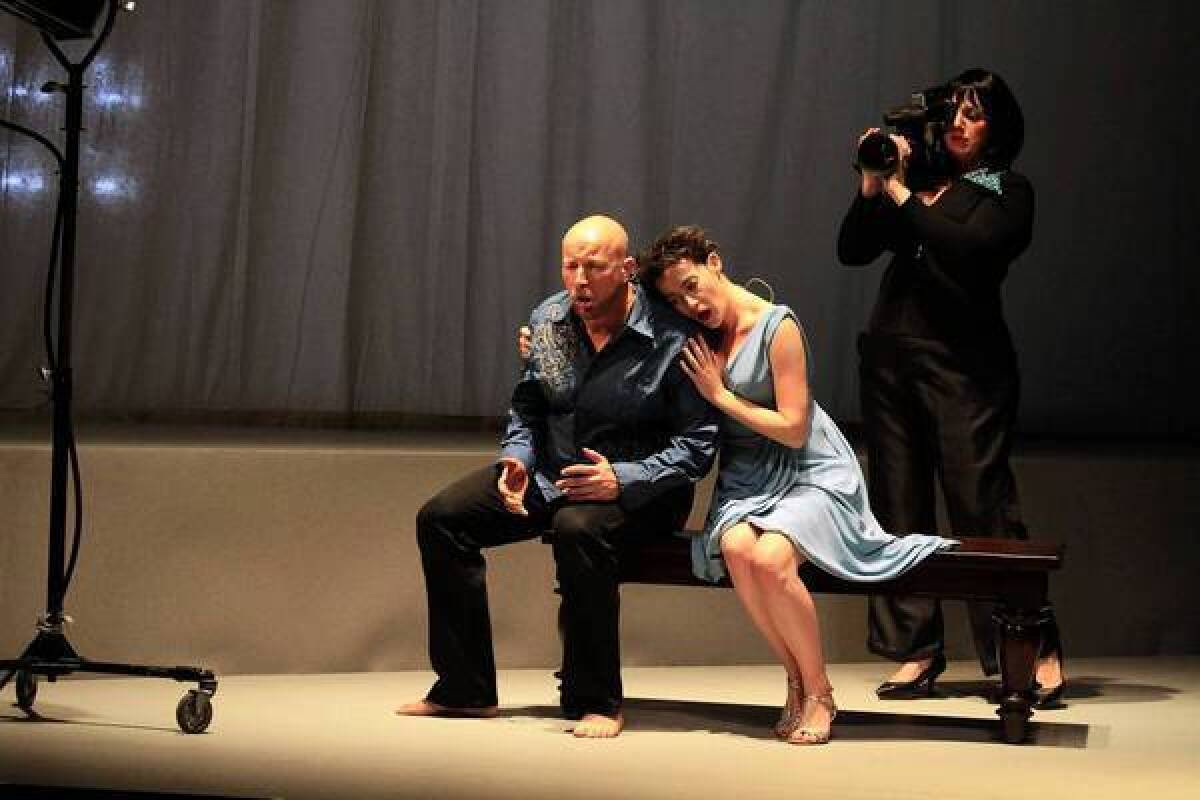Opera review: ‘The Face’ raises pertinent questions

- Share via
It took seven years for “The Face,” a new opera by composer Donald Crockett and poet David St. John, to get from its inception to its world-premiere staging at the Aratani/Japan America Theatre on Saturday night — and when three of its characters sing the lines, “What a long 11 months it’s been, the movie’s in the can,” you wonder if art is mimicking life.
Indeed, “The Face” strikes me as a collection of poetry that is still striving with all its might to become an opera, and it won’t be easy for a narrative-driven opera audience to follow without an advance reading of the synopsis.
Nevertheless, this 75-minute opera in 11 scenes leaves you pondering pertinent questions: Is celebrity worth the bother? Are the ego boosts of fame and public recognition enough to compensate for the loss of privacy to the media machine? (And it’s not just celebrities who are trapped; with Facebook and other social media broadcasting our lives to the world, almost everyone now is caught in the snare).
FOR THE RECORD:
“The Face”: In a review of the opera “The Face” in the Aug. 27 Calendar section, the tenor was identified as Daniel Thomas. His name is Daniel Norman. —
The setting is archetypal L.A., Venice Beach, where a has-been writer, Raphael, who dearly misses his late wife, Marina, is talked into having a film made of his life by a predatory female filmmaker, Infanta, and a Mephistopheles-like producer named Memphis. Marina appears only in idyllic silent home movies on a giant white screen that takes up half of the stage’s backdrop; she is seductive, intellectual, the perfect woman in this man’s fantasies. Cybele, the bisexual actress signed to play Marina in the film, is supposed to bear an uncanny resemblance to her, and of course, Raphael is attracted.
If you’ve guessed that this is a spin on the durable Faust legend, give yourself a gold star. But there is another precedent for this, Erich Wolfgang Korngold’s opera “Die Tote Stadt,” in which the lead character also obsesses about his dead wife and projects her onto a real-life look-alike.
Writing for eight players in the pit, Crockett has created a score that is often light in timbre, motor-driven in spots, elegiac in others, applying its colors in spare, sometimes enigmatic streaks. He introduces some Robert Johnson-like slide electric guitar in the scene where Memphis sings about “standing at the crossroads,” a Faustian reference to the myth of Johnson selling his soul to the devil at a Mississippi crossroads. He also gives Memphis a Broadway-like number with jagged rhythms in which St. John creates the metaphor of hell as a theme park, where your most humiliating life scenes are played on an endless loop like a bad thrill ride.
This is clever stuff that stays with you, but the opera doesn’t make you feel much empathy for Raphael. Like the manipulative characters, we too are detached voyeurs to the destruction of a human mind.
Stage director-choreographer Yano Iatrides, working with Paul Desveaux’s concept, kept things moving economically, creating striking images of Raphael and Cybele cavorting before the giant white screen. Daniel Thomas brought a pleasing lyric tenor to the role of Raphael, wearing rumpled clothes that indicated his character had spent some sleepless nights. Thomas Meglioranza sang Memphis with an ample baritone, forming a saucy vocal trio with mezzo-soprano Janna Baty (Infanta) and soprano Jane Sheldon (Cybele) toward the close of the opera. The pit band, an augmented edition of Boston’s Firebird Ensemble, played with point and clarity under the direction of Gil Rose.
There was a deliberate decision to project only selected portions of the text as supertitles, done to make certain sections intelligible to the audience and concentrate its focus on the drama in others. But I found that some of the passages without supertitles were not intelligible, and most of those with supertitles were perfectly understandable thanks to some good diction from the cast.
Suggested solution: Project it all.
---------------------------Where: Aratani/Japan America Theatre, 244 S. San Pedro St.
When: 8 p.m. Monday and Tuesday
Tickets: $15 to $110
Info: https://www.thefaceopera.com
----------------------------
ALSO:
The elusive ‘Other Mary’Donald Crockett’s ‘The Face’ opera adapts David St. John’s poetryOpera review: ‘Rigoletto’ is given character by Dudamel, L.A. PhilMore to Read
The biggest entertainment stories
Get our big stories about Hollywood, film, television, music, arts, culture and more right in your inbox as soon as they publish.
You may occasionally receive promotional content from the Los Angeles Times.










